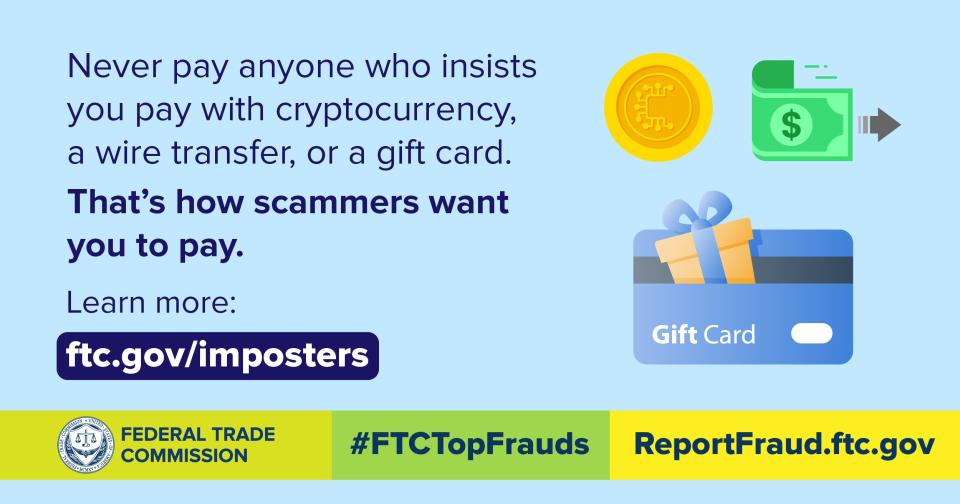The “IRS” is on the phone. They’re saying you owe back taxes and need to pay immediately using cryptocurrency, or you’ll be arrested. You reach for your wallet but then think — WAIT — is this really the IRS? Or is it someone impersonating the IRS?
According to the latest FTC data, impersonation scams were the top reported scam in 2022. The FTC got more than 700,000 reports about impersonation scams, with one in five including loss of money.
So, what do impersonation scams usually look like? Someone may call, tell you they’re from a government agency, and say you owe taxes or a fine. Or they may pretend to be a family member or friend in trouble, who needs money right away. They may pose as someone from a tech support company and claim there’s a problem with your computer. Or pretend they’re a love interest who needs an expensive medical procedure.
What’s the common theme? They’re not who they say they are, and what they really want is your money or personal information.
Here’s how to avoid impersonators:
- Don’t give your personal or financial information to anyone who contacts you out of the blue. Government agencies won’t call, email, text, or message you on social media to ask for personal information, like your Social Security or bank account numbers.
- Know how scammers tell you to pay. Never pay anyone who insists you pay with cryptocurrency, a wire transfer service like Western Union or MoneyGram, or a gift card.
- Don’t trust your caller ID. Your caller ID might show an actual government agency or company’s name or phone number. But caller ID can be faked. It could be anyone calling from anywhere in the world.
- Don’t click on links in unexpected emails or text messages. And never give remote access to your computer to anyone who contacts you unexpectedly.
Come across an impersonation scam? Report it to the FTC: ReportFraud.ftc.gov.
This month we’ll be discussing the #FTCTopFrauds of 2022 — stay tuned!


wow amazing and informational
Considering the warning of the payment method, no one should be scammed of money. On representing the government falsely, thought that was a crime. what is the FBI doing that has to do with their pledge to obey the constitution and protect citizens????
I keep reading that the IRS will not call you, yet you are required to give them your phone number on your tax return! It’s hard for people to sort things out like this, what is real and what you should ignore in life.
The Report Fraud website won't open!
Ironically I have been contacted by an individual claiming to work for a Bureau of the FTC. I note the convincing email sent ended in “.com” not “.gov”. A US accent calling Australia also gave a hint - though perhaps the US is concerned with the global nature of consumer scams. May I ask how should I report the event?
In reply to Ironically I have been… by T Butler
Please tell the FTC at www.ReportFraud.ftc.gov.
If it was the IRS they got violated on the do not call list, and I gave them zero except:
"I do not give out any info to unknown callers" and hung up. Hopefully not enough to steal a voice print for simulation. As I said about the Census, the hackers have make the internet and phone system almost useless due to the lack of enforcement. The design needs to change so the caller and sender of messages can be positively identified.
In reply to If it was the IRS they got… by millerf1
I really was the IRS. They sent a letter to call them...
In reply to I really was the IRS. They… by millerf1
We called them back and left messages repeatedly and they never called again.
If they are definitely a leak in the government payroll if not scammers.